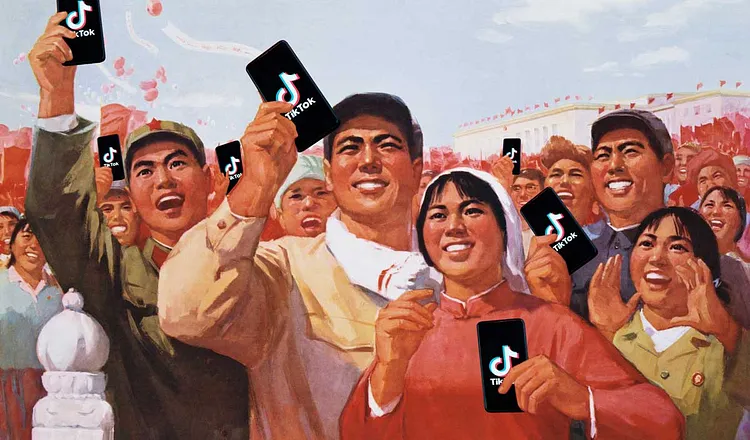Outgoing FBI Director Christopher Wray revealed during an interview on Sunday, a week before he steps down, that China has penetrated America’s water treatment plants, electric grid, and other critical civilian infrastructure and is lying “in wait” for an opportunity to cyberattack at a time and place of its choosing.
We are also learning that China is penetrating Americans' minds- particularly our youth.
Be informed, not misled.
I am not a fan of Christopher Wray.
However, as Director of the FBI, he should know these things, even though he has apparently taken little to no action.
Remember the big white balloon floating over America for days with no action taken by the Biden Administration except telling us it was "nothing" just a "weather balloon?"
Nobody believed the administration, which finally forced them to shoot it down as it left our airspace.
And it forced them to tell the public that it was a surveillance balloon launched by China.
Asked on CBS’s 60 Minutes about Chinese penetration of U.S. cyber and infrastructure, Wray said China’s cyber program is the largest in the world and has stolen more of Americans’ personal and corporate data than every nation combined. Then, he added:
But even beyond the cyber theft. There’s another part of the Chinese cyber threat that I think has not gotten the attention publicly that it I think desperately deserves. And that is Chinese government’s pre-positioning on American civilian critical infrastructure. To lie in wait on those networks to be in a position to wreak havoc and can inflict real-world harm at a time and place of their choosing.
Why has the Biden Administration not taken action on this information?
Wray said China has already infiltrated malware into critical American infrastructure.
“Things like water treatment plants. We’re talking about transportation systems. We’re talking about targeting of our energy sector, the electric grid, and natural gas pipelines. And recently we’ve seen targeting of our telecommunications systems,” he said.
Wray said China has also been listening to Americans’ calls.
CBS News said China has gathered communications of U.S. national security officials, as well as the Kamala Harris campaign and President-Elect Donald Trump himself.
If he knows all this, why has no action been taken? Why are these people only sharing what the American public deserves to know days before he retires in Florida—or wherever?
The revelation prompted outrage from former Trump administration officials who say Wray did not do enough to stem the threat from China on his watch, only to discuss it publicly a week from stepping down.
Joshua Steinman, former National Security Council senior director for cyber security during the Trump administration, posted on X:
"This enrages me. I left them with the tools they needed to confront this. And it appears those tools went unused for four years. Total mismanagement."
This enrages me.
— joshua steinman (🇺🇸,🇺🇸) (@JoshuaSteinman) January 12, 2025
I left them with the tools they needed to confront this.
And it appears those tools went unused for four years.
Total mismanagement. https://t.co/cHawQMHWoG
Agreed.
China is also apparently trying to steal the minds of our kids.
As Supreme Court justices ponder the future of TikTok in the United States, a growing number of American social media users have responded by moving to an unlikely alternative: Xiaohongshu, a hugely popular social media app in China.
The app, which means “Little Red Book,” often shortened by US users to RedNote, surged to the top position on Apple’s US App Store on Tuesday.
Founded in 2013, Xiaohongshu is one of China’s biggest social media platforms with 300 million users, according to research firm Qian Gua. Described as China’s answer to Instagram, the app has become especially popular for sharing tips on travel, makeup, and fashion.
But while it has cornered the Chinese market, it hasn’t gained much prominence beyond the Chinese-speaking world. Until now.
Why is Xiaohongshu everywhere?
Xiaohongshu is surging in popularity worldwide in the same week that TikTok could potentially go offline in the US.
A growing number of American TikTok users have started appearing on the platform, often saying they’re doing so as an act of defiance against Washington’s move to control TikTok.
As of Tuesday, the hashtag “TikTok refugee” had garnered nearly 60 million views and over 1.7 million comments.
“Our government is out of their minds if they think we’re going to stand for this TikTok ban,” a user called Heather Roberts said in a video message on Xiaohongshu, which has garnered more than 45,000 likes. “We’re just going to a new Chinese app, and here we are.”
“This is so much better than TikTok,” another self-proclaimed “refugee” said in a video message. “Americans are coming here … so sorry you’ll hate us, but I promise we’ll do our best.”
CNN notes, "Xiaohongshu’s name could be seen as a tongue-in-cheek reference to a red-covered book of quotations from the founding father of Communist China, Mao Zedong."
CNN is dead wrong. It's more than a "tongue-in-cheek reference."
Mao Zedong's Little Red Book lives on.
Sun Tsu, one of China's most celebrated Generals, once said, “In the practical art of war, the best thing of all is to take the enemy's country whole and intact; to shatter and destroy it is not so good.”
China is obviously reading the book.
China’s indoctrination isn’t hypothetical. It’s real.’
According to The Free Press, an updated study by Rutgers University's Network Contagion Research Institute (NCRI) shows conclusive evidence that TikTok "downplays negative content related to China." This includes events like Beijing's bloody 1989 Tiananmen Square incident and the concentration camps filled with Uyghurs in the Xinjiang province.
The research shows a disturbing trend of content meant to make China seem like a great country, with the direct intention of changing Western minds about it:
The report presents TikTok as an example of the “persuasive technologies” China is developing to shape public opinion in the West. Another major conclusion of the report, based on online polling, found that the more time users spent on TikTok, the more positively they viewed China’s human rights record and its desirability as a travel destination.
“This scaled indoctrination isn’t hypothetical. It’s real,” Finkelstein told The Free Press. “I think that the Supreme Court hearing now isn’t about whether or not we’re dealing with a hypothetical threat. The Supreme Court hearing is about whether we’re going to allow this continued indoctrination.”
According to NCRI, more than 80 percent of the content generated in an Instagram search on the Uyghurs was negative toward China, compared to around 11 percent on TikTok. A search for “Tiananmen” on YouTube, meanwhile, generated content that was 65 percent negative for the Chinese government, compared to just 20 percent on TikTok.
The “results strongly suggest that algorithmic amplification of pro- and anti-CCP content on Instagram and YouTube is largely determined by commercial consideration, whereas advancing CCP propaganda plays some role in the algorithmic curation of TikTok content,” the study reads.
The Little Red Book, written by Chairman Mao Zedong, is a compilation of quotations from speeches and writings by the former chairman of the Chinese Communist Party. It was published from 1964 to 1979 and widely distributed during the Cultural Revolution.
It contains 267 aphorisms from the Communist Chinese leader, covering subjects such as class struggle, "correcting mistaken ideas," and the "mass line," a key tenet of Mao Zedong.
I cannot tell you how many discussions I've had, as a youth pastor, with college students who were convinced that Mao's Communism was so much better---more equitable than capitalism and more relevant than Christianity.
Takeaway
The original 1964 production of The Little Red Book was related to the behind-the-scenes political maneuvering that would eventually lead to China's Cultural Revolution. It became the emblem of this ten-year cycle of instability in the end.
The People's Liberation Army first published it in 1964, and an early version was dubbed 200 Quotations from Chairman Mao. It quickly became a central aspect of the leader's personality cult. Hundreds of new printing houses were designed to meet the Ministry of Culture's goal of distributing a copy to every Chinese person.
Nothing has changed for the Communists.
Except they no longer need the printing press. They now have the internet.
It was Lenin who said, "We must stop at nothing. Everybody and everything must be used to save the rule of the workers and peasants, to save communism."
A November report by the Australian Strategic Policy Institute tracked the activity of dozens of Chinese companies engaged in ideological training, online emotional detection, and managing public opinion. Many of the firms tracked by the institute either have commercial ties to the Chinese military and the CCP or are partly owned by them.
“The rapid adoption of persuasive technologies,” the report concludes, “will challenge national security in ways that are difficult to predict. This presents malign actors with the ability to sway opinions and actions without the conscious autonomy of users.”
Beware.
Be Informed. Be Discerning. Be Vigilant. Be Engaged. Be Prayerful.




